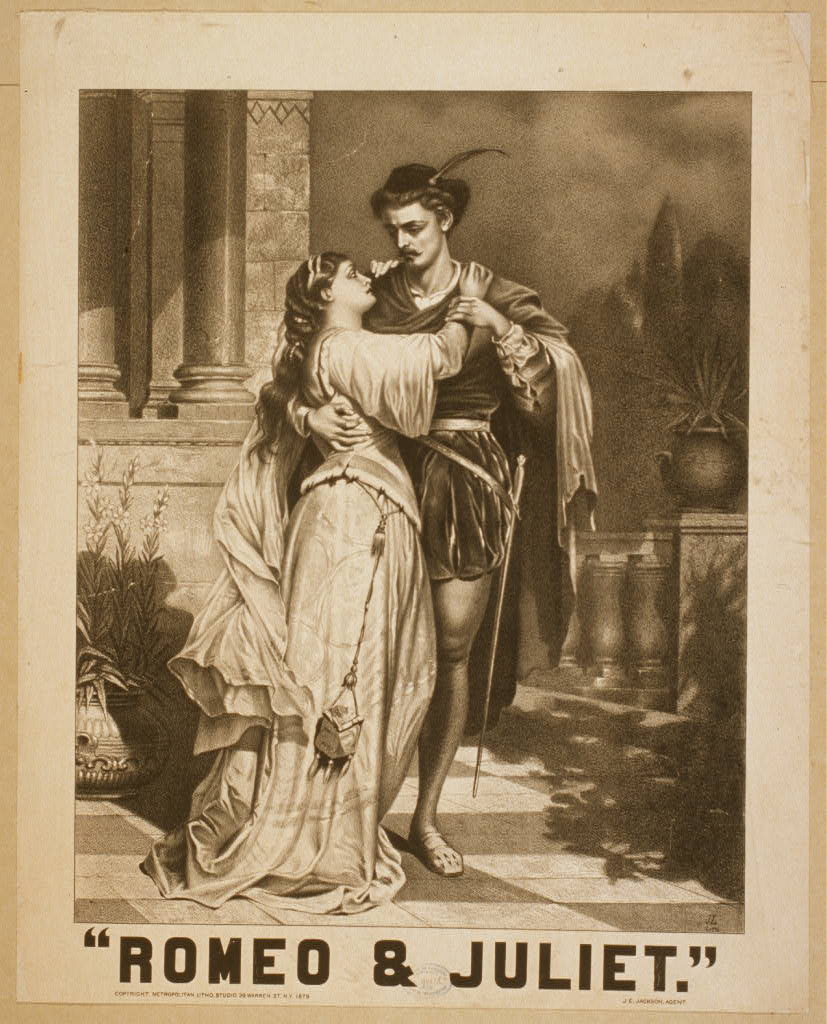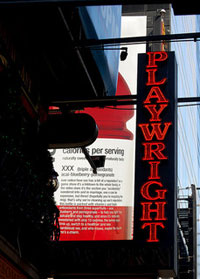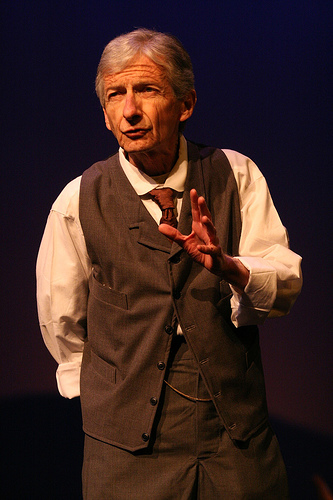
Source: Romeo Juliet, Library of Congress
William Shakespeare and Thornton Wilder had dramatic flair, a sense of the theatrical, and will not soon be upstaged as playwrights. Drama, a genre where both found success, albeit many years apart, shares some literary elements with poetry. The character Romeo, in Shakespeare’s classical play Romeo and Juliet, speaks in iambic pentameter and rhyme.
If I profane with my unworthy hand
This holy shrine, the gentle fine is this:
My lips, two blushing pilgrims, ready stand
To smooth that rough touch with a tender kiss. (1.5.96–99).
 If Shakespeare had written “My lips, like two blushing pilgrims,” he would have written a
If Shakespeare had written “My lips, like two blushing pilgrims,” he would have written a simile. What type of figurative language does he use instead? Use your notes
to record your answer. Then, check your understanding to see if you are correct.
Sample Response:
Shakespeare uses a metaphor.
Despite some of its similarities with poetry, drama has a number of unique conventions and, hence, some different terms:

Source: Playwright, SimplySteff, Flickr
- Instead of stanzas, plays are divided into scenes, where the set often stays the same, and acts, where the curtain closes so the stage crew can hustle in to move a couch offstage and replace it with a street lamp, for example. The play Our Town, which you will soon see, has few props.
- Plays can be tragedies with sad endings, comedies with happy endings, or tragicomedies, mixtures of tragedy and comedy, usually plays with serious happenings that expose the characters to the threat of death but that end happily.
- Playwrights—writers of plays—are called “wrights” because this word means “builder.” Just as shipwrights build ships, playwrights build plays.
- The playwright includes the setting in the script. The setting for the play Our Town by Thornton Wilder is Grover's Corners, New Hampshire, on May 7, 1901, just before dawn.
- There’s no “he said” or “she said” in plays; the script cues the characters when to speak. Plays consist primarily of dialogue, but sometimes characters talk aloud to themselves in monologues or soliloquies, so that the audience, but not other characters, can hear them.

Source: IMG_1516.JPG, wwwes, Flickr
In this scene you are about to read from Thornton Wilder’s play Our Town, the Stage Manager, who is the narrator, tells us who’s coming onstage. Read the following passage and then return to this section and continue with the lesson.
Reading a script allows you to know exactly what the playwright provided for the director and the actors, but it doesn’t enable you to fully experience drama. To do that, you must go to the theater to see a production of the play. The lucky thing is that this classical play is so well known that you may have already seen it performed. According to the playwright’s nephew, Tappan Wilder, it’s widely believed that Our Town is performed “at least once each night somewhere in this country.” Now, watch this same scene acted out.
How did your viewing experience compare with your reading experience? Were the characters similar to the people you envisioned? Were you able to pick up the mood? Was there more to the relationship between Joe and Doc Gibbs than you thought by reading their lines? What else did this scene reveal that you didn’t pick up in the reading?
There’s no suspense about what happens to the paperboy, Joe Crowell, Jr. The Stage Manager—played by Paul Newman—magically peers into the future and reveals Joe’s tragic end. Through this character, Wilder uses a storytelling device called dramatic irony, a device not limited to drama, where the audience or the reader has more information than the characters.
Simply put, dramatic irony is when a person makes a harmless remark, and someone else who hears it knows something that makes the remark have a different, and usually unpleasant, meaning. For instance, if you were in a restaurant and said out loud, “I can't wait to eat the veal marsala I ordered,” and there were people around who knew that the veal marsala was poisoned and that you would die as soon as you took a bite, your situation would be one of dramatic irony.
—Lemony Snicket, The Reptile Room
Now that you have completed the section that discusses terms associated with drama, look at the list of terms found in this PDF. Use your software’s highlighter or other tool to mark the ones you need to review further.